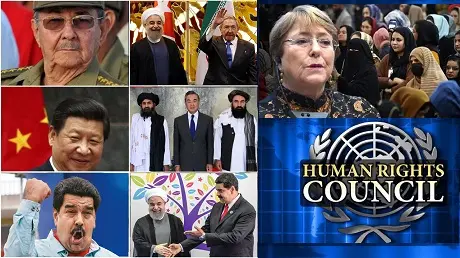 Will the Human Rights Council composed of dictatorships condemn the Taliban?. We will have to wait for a report in the first quarter of 2022. Afghanistan: UN talks of summary executions and sets a red line for the Taliban.
Will the Human Rights Council composed of dictatorships condemn the Taliban?. We will have to wait for a report in the first quarter of 2022. Afghanistan: UN talks of summary executions and sets a red line for the Taliban.
Michelle Bachelet, head of the United Nations Human Rights Council, on Tuesday called for strong measures to investigate reports of rights violations by the Taliban, which include killings, recruitment of child soldiers, restrictions on women's rights and repression.
GENEVA.- Amid global concern and a dearth of concrete information from the ground, the head of human rights at the United Nations (UN), Michelle Bachelet, warned Tuesday that she has received credible reports of "summary executions" and restrictions on women in areas of Afghanistan that are under Taliban control.
The allegations stoked fears about the possible devolution of the extremist regime, which has been in charge of the Afghan government for just over a week, following the planned departure of U.S. military forces.
In this context, Bachelet urged the Human Rights Council to take "firm and bold measures"to monitor the rights situation in the Eastern country.
Bachelet urged the Human Rights Council to take "firm and bold measures"to monitor the rights situation in the Eastern country.
Reports from Afghanistan, amid the chaos, are spotty and it is difficult to determine the extent of the violations and to identify whether the alleged rights violators are Taliban or independent fighters.
Bachelet also set a "red line" for the treatment of women in Afghanistan. "A fundamental red line will be how the Taliban treat women and girls and respect their rights to freedom, freedom of movement, education, self-expression and employment, in line with international human rights standards," she warned.
This Tuesday, leaders of the G-7 -comprising Germany, Canada, the United States, France, Italy, Japan and the United Kingdom-will meet virtually to discuss the emerging refugee crisis and the political meltdown in Afghanistan.
They are also expected to assess the possibility of delaying a full withdrawal of U.S. troops Afghanistan.
It is also expected to assess the possibility of delaying the complete withdrawal of U.S. troops beyond the end of the month, so as to extend the time to evacuate more people from the country, as hundreds of residents desperate to leave, as reflected in the images from Kabul airport in recent weeks, where the mothers and fathers handed over their babies to the military West and even a couple of young men came to climb on the wings of an airplaneto try to emigrate. Se registró la muerte de al menos 14 personas en su intento de dejar Afganistán.
However, in the administration of Joe Biden they remain skeptical about the extension-of-stay-of-armed-forces, while the Taliban warned, through a spokesman, that August 31 represents "a red line," and extending the U.S. presence "would provoke a reaction."
Details on the allegations
Chile's ex-president called Tuesday for strong measures to investigate the reports of rights violations and sought to ensure that international attention on the country did not fade.
"At this critical moment, the people of Afghanistan look to the Human Rights Council to defend and protect their rights,"', he said. He added: "I urge this Council to take firm and bold action, commensurate with the gravity of this crisis, by establishing a dedicated mechanism to closely monitor the evolving human rights situation in Afghanistan."
By "mechanism," the UN official was referring to the possibility of the Council appointing a commission of inquiry, a special envoy or a verification mission on the situation in the East. Activist groups such as Human Rights Watch also pushed for such an initiative, and other NGOs called for the launch of an international investigation, such as the one the Council has disposed in Venezuela and Burma.
A few days earlier, a private intelligence group based in Norway that provides information to the United Nations said it had obtained evidence that the Taliban had detained Afghans on a blacklist of people it believed had held key posts in previous governments or with U.S.-led forces.
Several Afghans remain in hiding and say they fear reprisals, particularly for memories of the last Taliban government in the late 1990s. Back then, the group confined women to their homes, banned television and music, cut off the hands of suspected thieves and held public executions.
Afghanistan's government is still in hiding.
Bachelet noted that Taliban leaders have promised to respect the rights of women, girls and ethnic minorities, and to avoid reprisals, and that "it is entirely up to the Taliban to turn those commitments into reality." Before the more than 40 countries that make up the Council, she considered that "guaranteeing access to quality secondary education for girls will be an essential indicator of commitment to human rights."
Afghan women and children displaced from the northern Afghan city of Kunduz in a mosque that gave them shelter Getty Imges.
The UN official and former head of state, who in early August had mentioned "reports showing violations that could constitute war crimes" in Afghanistan, stressed Tuesday that "human rights violations undermine the legitimacy of their perpetrators vis-à-vis the population and also vis-à-vis regional and international institutions and vis-à-vis other states."
The session was held at the behest of Pakistan, in its capacity as coordinator of the Organization of Islamic Cooperation (OIC) for human rights and humanitarian issues, and of Afghanistan, represented by Nasir Ahmad Andisha, diplomat that the former government had appointed, with the support of a hundred countries.
The draft resolution submitted by Pakistan on behalf of the OIC merely calls on the High Commissioner to investigate human rights violations and publish a report by the first quarter of 2022.
Agencias AFP y AP


/cloudfront-us-east-1.images.arcpublishing.com/lanacionar/2OKXBZ7XLFE4LORNHAEU76KZSE.JPG)
/cloudfront-us-east-1.images.arcpublishing.com/lanacionar/TUZJOYRGRBBC5LVA6FN6K25AUQ.JPG)
/cloudfront-us-east-1.images.arcpublishing.com/lanacionar/FSBNRUK67RE5LER3RVGIUKH7F4.JPG)